- Home
- Will Hobbs
Kokopelli's Flute Page 9
Kokopelli's Flute Read online
Page 9
“You are old….”
“Very old.”
“Thousands of years old?”
“Thousands.”
“And you came to see us …. are you by chance Mr. K., too—the one who’s been sending us seeds all this time?”
“Sure, that’s me.”
“I wish I could tell me parents all about you! They love Kokopelli, and they love Mr. K.”
“I know. But you can’t tell them anything more than what they can figure out for themselves. Magical persons have secrets no one else can understand.”
“Can you help me, Cricket? Can I still call you Cricket?”
He chuckled and said, “Call me Cricket. Yes, I’ll help you if I can. But you don’t seem like you need any help.”
“But every night I’m in the body of this woodrat.”
“The woodrat people are good people.”
“My mother likes woodrats,” I told him.
“She is an unusual person. Is it a secret, what your mother studies in the basement?”
I told him about my mother studying the midden at the ruin where I had found the flute, and the middens two and four and six miles away. He liked the idea that she could send away samples and find what century they came from.
“She loves the ancient times, the ancient people,” I said. “She’s trying to find out why they left.”
Cricket heaved a sigh. “Time will have its way—everything that flowers, dies. Yet it can also live on in a new way, as long as the seeds are good. You know these things.”
At that, Cricket took up his flute and played his song of wind and rain and stars, the same song the insect had played with its wings.
The path of Dusty’s eyes caught my attention. I noticed that she was following the advance of a squash runner that was moving up Cricket’s leg and over the top of his knee as he played, climbing toward the flute. I was watching its leaves, tendrils, and flowers opening before my very eyes.
Cricket took the flute from his lips. “Tell me how your father first came to love the seeds.”
“He grew up in a city—Chicago. His parents grew up in Chicago, too. It was his mother’s parents who used to live on a farm, somewhere in the middle of Ohio. My father never used to know much about the farm, but when he was about my age he came across an old fruitcake tin among his mother’s things in the basement, and in that fruitcake tin, along with other mementos of her mother, he found a handful of beans in a small jewelry box.”
“That’s good,” Cricket said.
The squash, I noticed, had slowed considerably since Cricket had left off playing, yet my eyes could still detect motion as I continued with my story: “My father asked his mother about the beans, and his mother told him that her family had always grown these beans in their vegetable garden on the farm, over many generations, for a hundred years or so. According to the story that was passed down with the beans, the first of her family to come into that country were starving early in their first winter. It had been a terrible fall, with one blizzard after another, and the family had nearly run out of food. The nearest settlement was sixty miles away. They knew they wouldn’t make it until spring.”
“That’s very bad,” Cricket said.
“They were saved by an Indian family who’d had their land taken away from them. The family was moving west, to try to join some relatives. The Indian family gave my father’s great-great-great grandparents enough beans to get them through the winter. Ever since then, my father’s ancestors kept those beans going, as a way of remembering, and because they were good beans, too.”
“Sure, sure.”
“But when my grandparents left the farm, nobody kept raising the beans. The last ones were in the fruitcake tin.”
“That’s very bad.”
“I know. My father tried to plant some of them, but of course they wouldn’t sprout. That’s when he first started to learn about seeds, how you have to keep them going. It took a long time, but finally he found a way to start the Seed Farm and keep other kinds of beans going, and lots of other things, too.”
“That’s a good story. Your father is a good person.”
“I know. Now there’s something I want to ask you … can your flute make it stop happening, make me stop turning into a packrat?”
“Oh, no, my flute can’t do that. My flute brings rain, makes things grow. And it might have some healing power still.”
I was thinking hard. “If I got the other flute back, what would happen if I blew on it again?”
“I’m not sure you should do that. You might turn into a snake, or a spider, or a bear or something. That’s a powerful flute. You have to know the right notes to erase what you did before. I don’t think you can simply blow on it again. You should think about staying how you are—a human being and a rat. You’ve been lucky.”
“Lucky!”
“It’s an opportunity other people will never have.”
I paused and thought about what he had said, but still it didn’t seem like an opportunity to me. “Will I have to wait for the next eclipse of the moon?”
“That won’t be very long from now…. sixteen years.”
“Sixteen years! I’d be twenty-nine years old!”
“You wouldn’t have to wait if you knew the right notes. If you knew the right notes, and you had the flute, you could undo this anytime.”
“What are the right notes?”
“The problem is, that flute wasn’t mine to begin with. The pink-skinned man would know the right notes—he was the last one to inherit that flute and know its secrets. With the power of that flute, he could change into different animals and back to himself. This man you’re talking about, he made some of the pictures up there where the people lived in the cliff. He told me he was going to leave a message in the pictures about a few very important notes for that flute.”
“Which pictures have that message?”
“Describe them for me—maybe I’ll remember.”
I described the lightning, the bird-headed men, the bear tracks and the rest. He stopped me when I described the two spirals surrounded by corn, with the flute players on either side.
“Spirals?” he asked.
I drew a spiral in the dirt, starting in the center and then making tight circles growing out and out.
“Sure, I know what you mean. Those are the pictures he was making. Sometimes those spirals show the people’s journeys between worlds and their migrations in this world. I have a feeling those pictures tell the notes you want to know, but it wasn’t something for me to know myself. It’s not my flute.”
“Thank you anyway,” I said. “Maybe that will help.”
“Will you help me with something?”
“Sure. What is it?”
“Raven’s waiting for us to play that trick on Coyote. Coyote’s been causing trouble in your field, you know.”
“I know.”
“If we can trick Coyote, you won’t have any trouble from either one of them again. Coyote’s over there in the corn right now. That’s where you’ll meet him, and then you lead him to the gourds.”
“Can Dusty come with me?”
“Of course you can’t take Dusty with you—Coyote would never go for that. You’ll have to be alone. In the gourds, that’s where we’re going to play a little trick on him. I want you to get Coyote into a gourd-eating contest. Coyote loves to gamble. Make him promise that if you win, he’ll leave your fields alone forever. Then so will Raven.”
“I’m going to eat a gourd?
“The gourd you eat will be from a special seed I brought from Mexico. I planted it four days ago and I’ve been giving it special attention. The special gourd seed is from a vine I found growing in the dry shadow of the mountains down there—the only one of its kind.”
“But how can I eat a gourd? Look what happened to my father!”
The old man said mysteriously, “Look for a sign, and believe that you can do it. You are Tepary Jones!”
“But
what if Coyote wins?”
Cricket thought about it, and then admitted with a shrug, “I guess he eats you.”
16
I left Dusty with Cricket and made my way toward the Hopi corn. I hardly had an idea what I was supposed to be doing. The breeze stirring my whiskers seemed to carry a warning, but I couldn’t tell what was wrong. My heart was beating out of control. Without Dusty I was an easy target for all the night hunters. I paused, thinking I could hear the slightest bit of movement.
Then I saw it—the tail end of one of our enormous gopher snakes disappearing down a hole.
In a moment, the snake had vanished. I held my breath and kept on moving. Up ahead, I could hear something the likes of which I’d never heard before. Using the cover, I crept toward the sound and found it was coming from a small patch of Hopi blue corn—the ears were not only ripe, they were bursting from their husks! Hopi corn grows in squat bunches, never getting very tall at all, but these plants were reaching the height of a grown man right before my eyes!
The sound of the corn had attracted someone else. I saw the eyes first, intelligent and mischievous, glowing in the dark. They were the yellow eyes of Coyote, and they were locked on me. His tall ears were perked forward—I knew he’d make a dash for me at any moment.
Running couldn’t help me; it was too late for that. I had to do something to throw him off, something strange. Somehow a tip beetle’s antics came to mind, and I did exactly what the tip beetle does: I stuck my head under the dirt and kicked my hind feet up in the air.
I could see nothing now, but I held that position for it seemed like forever, until I heard Coyote’s voice above me. “Ho, Rat, I’m going to bite you.”
“Hold on there,” I said.
“What’s that you said? Speak clearly!”
I was madly trying to think, to think of anything. “Hold on!” I hollered. “I hear something strange down here!”
“Oh, yeah? What is it?”
“Quiet, I’m listening to the people down here. They’re saying something about you.”
I heard Coyote digging, and I counted to twenty. Then I pulled my head out of the ground and saw, just as I’d hoped, that his head was under the soil. I started to run away but he was too quick for me. With a glance over my shoulder, I saw him sailing through the air with an arching leap. Now he had me in his jaws.
I knew that he would want to play with me a little, as coyotes do, before he shook me hard and broke my neck. And that’s what he did. He stood on two legs and tossed me high in the air. I was still in the air when something else caught his attention—the sound of bursting ears of corn, louder than before. “Listen to that corn!” Coyote marveled as I hit the ground.
My mind was racing. Only with more strangeness, I thought, could I keep Coyote distracted. All I could think of was to say, “What is corn?” as innocently as if I was born yesterday.
Coyote tossed his long snout into the air and laughed. “‘What is corn?’ ” he howled. “‘What is corn?’ Ha-ha-ho, hee-ha-ho-hee! ‘What is corn?’ ”
Even as we spoke, the husks were opening and enticing Coyote with rows of blue corn.
“‘What is corn?’ ” Coyote asked with a smirk, as he took an ear and made short work of it. “This is corn, O Rat!”
The juicy kernels made foam around Coyote’s mouth as he ate one ear after the next. In between gulps, he said, “You have got to be the stupidest rat I’ve ever met! Ever even heard of! Why, corn is plump and corn is delicious, corn is blue and corn is golden, corn is red and corn is sweet and corn is practically better than … meat!”
Coyote tore into every ear from that little patch, eating only a mouthful from each and dropping it on the ground before he greedily started in on the next.
I told him, “I used to eat that stuff you call corn. But it just doesn’t compare….”
Coyote’s ears stood up sharply, and his huge tail switched back and forth. “Compare to what?”
“Follow me,” I said. “I’ll show you something that will make your taste buds forget all about this stuff.”
When I led him to the gourds, Coyote’s yellow eyes flashed angrily. “You are definitely the stupidest rat I’ve ever laid eyes on! You think you can fool me with one of these?”
With a backward glance, I saw Coyote’s teeth clicking, and there was murder in his eye. I kept moving through the gourds, looking for the one I was supposed to eat. How was I supposed to tell? Cricket, I thought, I’m in big trouble now. “Look for a sign,” you said. I don’t see any sign!
All around the gourd patch I scurried, concentrating as best I might, looking for a sign, but I couldn’t think with my heart in my throat. Closer and closer behind me came the sound of Coyote’s snapping jaws. I was about to run for my life when something moving caught my eye: the katydid’s long green antennas, seeming to wave me toward him. The insect was perched on top of a striped gourd. That must be the one I needed! As soon as I got there, the insect was suddenly gone. Quickly I bit through the stem fastening that gourd to its vine, and turned with the gourd in both hands to face Coyote. “Much sweeter than corn,” I said confidently.
Coyote was grinning. “Sure it is, Rat. Go ahead and eat it. Prove how sweet it is. You eat one, and then I’ll eat one.”
“Gladly,” I said. “But let’s make it interesting. If I eat mine, every bit, but you don’t eat yours, every bit, then this whole field is mine and you can never come back.”
“Yes, of course,” Coyote said. “I want to see this.”
It was my moment of truth. Cricket said I could eat this gourd. It was crazy, but I trusted him, that old man, that bug, Cricket, Mr. K., Kokopelli.
Boldly, I bit into the gourd. It was sweet like a sweet squash, almost like a melon. From a vine he’d found in Mexico, Cricket had said, one of a kind. I chewed noisily and happily, smiling all the while. My father would be amazed! A wild gourd in Mexico, from its treasure house of hidden genes, had thrown a sweet mutant, just like its ancestor that had started the squashes! This gourd tasted sweet as a peach! Smacking my lips, I finished it off, enjoying Coyote’s astonishment.
Fortunately, with all the vines crisscrossing each other, Coyote didn’t happen to pick a gourd from the same plant. He bit into his as enthusiastically as I had mine, but his mouth suddenly puckered and he was spitting out the pieces. “Ugh! Ah! Ooh—awful! Disgusting!”
“Remember,” I admonished him, “you have to eat the whole thing, or give up this field.”
“I’ll gladly give up this field, O Rat!” With that, Coyote trotted off, his tail hanging even lower than usual.
When he got to the edge of the field, Coyote paused and looked back at me. “Some other time, Rat,” he said. “Some other place.” He shook his head back and forth, back and forth, and he coughed and spit. At that he turned and ran briskly into the night. Just then I heard the laughing of ravens.
When I hurried back to report my success to Cricket, I found Dusty in the squashes, right where I left her, but Cricket was gone. Dusty whined and tapped her old tail, grateful to see me. She looked up to see the headlights of a truck that was slowing along the road.
Dusty had to go investigate. Trucks hardly ever came through the valley in the middle of the night, and why was this one slowing, stopping?
I was right behind her, in the panic grass, when the spotlight fell on her. Poachers trying to spotlight deer? Dusty walked a little closer, blinded by the light.
A shot was fired. It sounded strange, not like a pistol or a rifle—more like a pellet gun. Dusty stood still at first, as if nothing had happened. Then she wobbled, and then she collapsed.
There was a tranquilizer dart sticking out of her side.
The spotlight went out. Two men jumped from the pickup and ran over to Dusty and grabbed her up. I was right there, in the panic grass, but they didn’t see me. One had a beard, the other a drooping mustache.
The pothunters!
“Nothing like the right tool for the job,” snic
kered the squat man with the beard. “A pot-sniffing dog!”
The pothunters threw some blankets around Dusty and placed her in the back of the pickup. Then they got in the front and fired up the motor. There was no way I was going to watch them drive away. I leaped onto the back bumper, but I couldn’t claw my way up and over the tailgate.
The truck was starting to move. I jumped free and ran forward underneath it, looking for a place to stow away.
I was running at full speed under the engine compartment, with the truck accelerating fast, when I jumped onto the frame, then climbed up the side of the motor and clung to the ignition wires feeding into the distributor cap.
It was a long and bumpy ride, and I suffered from the heat of the motor. We were climbing, I could tell that from the sound of the gears. I had time to begin to add up what had happened. Someone must have talked about Dusty.
I could make a pretty good guess. Our college students would have talked about Dusty in town, at the laundromat or at the café, about her finding the pot in front of Big Pink. Probably they’d passed on the history of her glorious archeological career that I should have kept to myself. Talking wouldn’t have hurt a thing, if the pothunters hadn’t still been around to hear about it.
That’s all it had taken.
17
At last the truck lurched to a stop. I heard the truck doors slam, and then the tailgate go down. One of the men said, “Let’s put her over by that tree.”
I scurried out, relieved to get away from the hellish heat of the motor. From behind the front tire I watched them laying Dusty down. She was still unconscious.
I could smell where I was even before I saw the shapes of the big trees in the starlight. I was up on top of Enchanted Mesa, where the yellow pines grow, the stately ponderosas with jigsaw-puzzle bark that smells like vanilla. I knew exactly where on the mesa I was. This was the one stand of old trees the loggers hadn’t gotten to yet.
The pothunters tied Dusty to the tree, and then they took a couple of black-on-white pots out of the pickup’s toolbox behind the cab. The brother with the mustache walked off with the pots, and the one with the black beard disappeared inside their big sheepherder tent.

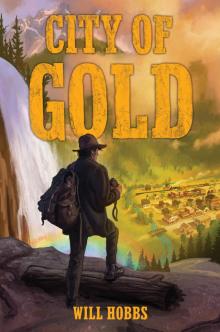 City of Gold
City of Gold Kokopelli's Flute
Kokopelli's Flute Take Me to the River
Take Me to the River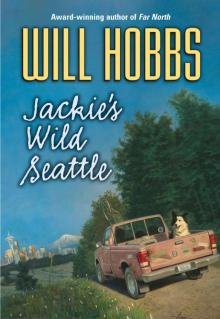 Jackie's Wild Seattle
Jackie's Wild Seattle The Maze
The Maze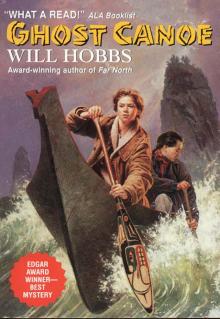 Ghost Canoe
Ghost Canoe Never Say Die
Never Say Die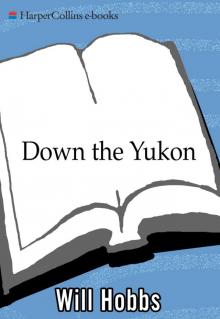 Down the Yukon
Down the Yukon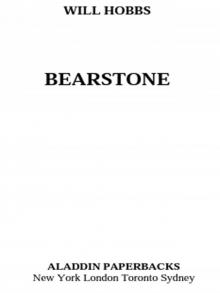 Bearstone
Bearstone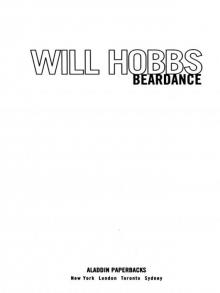 Beardance
Beardance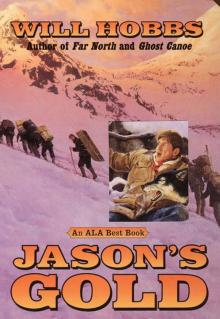 Jason's Gold
Jason's Gold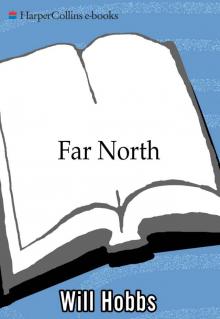 Far North
Far North The Big Wander
The Big Wander River Thunder
River Thunder Downriver
Downriver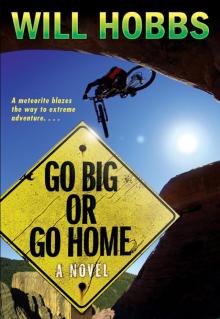 Go Big or Go Home
Go Big or Go Home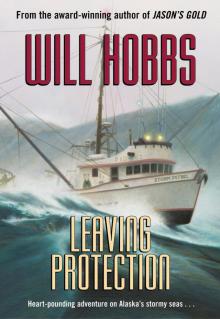 Leaving Protection
Leaving Protection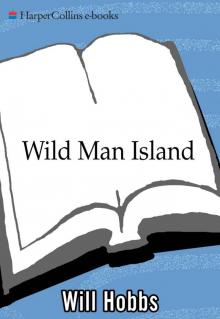 Wild Man Island
Wild Man Island